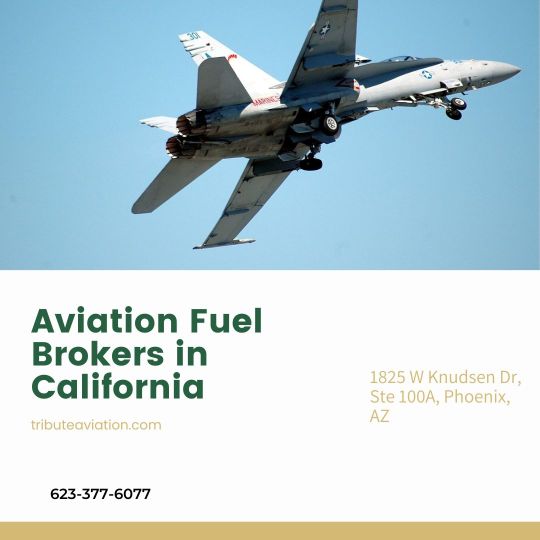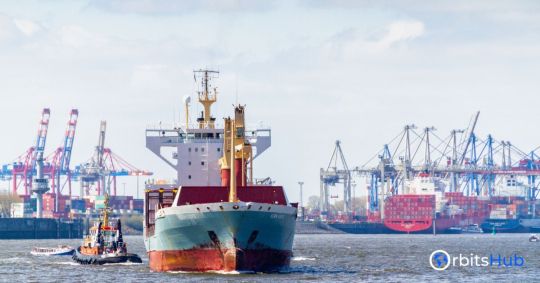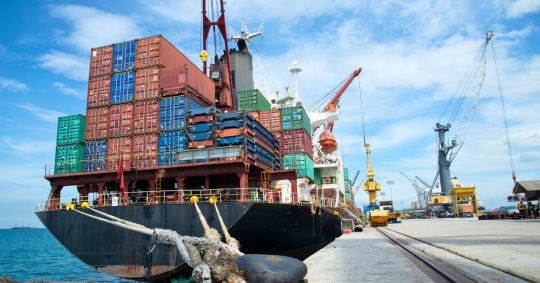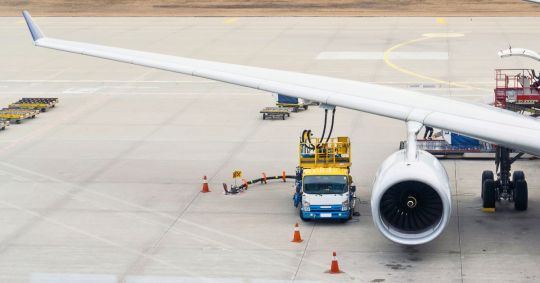#aviation fuel
Text
The Global Aviation Fuel Market size is projected to reach USD 696.2 Billion by 2030, from USD 249.9 Billion in 2022 at a CAGR of 13.7% during the forecast period. The Aviation Fuel Industry is driven by the increasing demand for air travel, along with the growing aviation industry in developing countries. The rising demand for low-cost carriers and the development of advanced aviation biofuels are also expected to create significant opportunities for market players during the forecast period. Factors such as volatile crude oil prices and stringent environmental regulations may hinder the growth of the market to some extent.
#Aviation Fuel#Aviation Fuel Market#Aviation Fuel Industry#Global Aviation Fuel Market#Aviation Fuel Market Companies#Aviation Fuel Market Size#Aviation Fuel Market Share#Aviation Fuel Market Growth#Aviation Fuel Market Statistics
0 notes
Text

Aviation Fuel Brokers in California
0 notes
Text
Navigating the Seas and Skies: Marine Services and Air Cargo's Symbiotic Relationship

Introduction
The effective transfer of commodities and resources has evolved into a crucial aspect of contemporary civilization in a world characterized by globalization and interconnection. Marine services and air cargo are two of the main participants in this industry. While at first glance they might appear to be separate fields, deeper examination reveals a strong connection that propels global trade and business. The cooperation between maritime and aviation services creates a complex network that supports worldwide logistics, from the delivery of aircraft parts to the exchange of valuable cargo.
The Vital Function of Marine Services
Marine services are the backbone of global trade because they make it possible for cargo ships to transport commodities over great distances. These vessels transport everything from consumer goods to raw resources, acting as floating warehouses. Since the oceans make up more than 70% of the earth's surface, cargo ships must sail complicated routes to link far-off shores, facilitating the interchange of goods on a global scale.
Marine services can include marine traffic management, a system that makes sure that ships can navigate safely and effectively. Ships can be tracked in real-time, optimizing itineraries and avoiding collisions, thanks to innovative technologies like satellite-based tracking systems. This degree of accuracy is necessary to maintain the flow of commodities and avoid supply chain disruptions.
The best timing and routes for cargo ships to depart are also heavily influenced by marine weather forecasts. Shipping businesses can make decisions that protect both their vessels and the cargo they transport by using accurate forecasts of the sea state and impending storms. In this approach, maritime services considerably increase the trustworthiness of international trade.
Air Cargo: Increasing the Supply Chain's Speed
Air cargo leads in terms of speed and urgency, whereas cargo ships handle bulk transit. The desire for prompt delivery of expensive products such perishable foods, medical supplies, and aircraft parts has fueled the expansion of air freight services. Specifically built for carrying freight, cargo planes are able to transport huge cargoes over long distances in a fraction of the time it would take by ship.

To reduce downtime for repairs and maintenance, aircraft parts, which are essential components in the aviation sector, frequently need to be delivered right away. The aviation industry can maintain smooth operations because to air cargo's capacity to quickly carry these components to their required locations. Air cargo makes sure that essential components, whether they be crucial aircraft engines or specialized equipment, arrive at their destinations quickly, minimizing operating delays.
Synthesis at Work
Air cargo and marine services have a complementary rather than merely antagonistic relationship. Imagine that a multinational company needs to ship aircraft parts to a far-off location. Although quick delivery of the parts might be guaranteed via air cargo tracking, the accompanying expenses might be too high. The maritime industry fills this role. In order to strike a balance between speed and cost-effectiveness, large amounts of less urgent components can be transported by cargo ships, while the more vital components are delivered by air.
Additionally, the partnership goes beyond actual transportation. Similar to those used in marine traffic management, air cargo monitoring systems offer real-time information on the whereabouts of cargo flights. This tracking capability improves transparency and allows businesses to keep an eye on and make necessary adjustments to their supply chain processes. Alternative plans might be made in the event that a cargo aircraft has unanticipated delays to guarantee the prompt delivery of products.
Marine and aviation fuel: feeding the Nexus
Air cargo and maritime industries both rely substantially on fuel to run their operations. To move container ships across seas, the maritime sector needs enormous amounts of marine petroleum, which accounts for a sizeable share of the world's fuel consumption. On the other side, aviation fuel maintains cargo planes in the air, ensuring quick delivery of cargo to its destination.
Innovations in fuel efficiency and alternative energy sources are vital for both industries as the world turns its attention to sustainable practices. The aviation sector invests in research to make air travel more environmentally friendly, while the maritime sector investigates cleaner propulsion systems and fuel alternatives. Both industries' parallel efforts to be sustainable demonstrate their dedication to reducing their negative effects on the environment.
Conclusion
Our integrated global economy is built on the dynamic interaction between marine services and air freight. These two fields work together flawlessly to ensure the quick movement of commodities across great distances, from the transportation of aircraft types to the exchange of precious cargo. The effectiveness and dependability of these services are improved by the development of technology like aviation cargo tracking and marine traffic management.
The difficulty comes from trying to achieve sustainability while preserving this delicate balance as we move forward. The maritime and aviation sectors must keep on innovating to find ways to lower their environmental impact and their carbon footprint. We can ensure the smooth circulation of products while conserving the health of our planet for future generations by nurturing this symbiotic relationship and adopting ethical practices.
#Marine service#air cargo#Aircraft Parts#maritime#cargo aircraft#Air cargo tracking#Aircraft engine#Cargo ship#satellite phone#aviation fuel#Marine traffic#marine weather forecast
1 note
·
View note
Text
Marine and air cargo services converge to improve global trade

Introduction:
Effective transportation infrastructures are crucial for the efficient movement of goods and services in a connected society driven by global trade. The maritime and aviation industries are two important areas that are crucial in this regard. Air cargo has emerged as a quick and dependable means of transportation, whereas marine services have long been a foundation of international trade. In this blog article, we'll look at how technical improvements and creative solutions have helped the fusion of maritime and air cargo services transform the logistics industry.
Marine Services: A Global Trade Anchor
A wide range of operations connected to the transportation of goods and services through waterways are included in marine services. Cargo ships, which frequently transport enormous loads, are the foundation of global commerce. Raw resources, finished goods, and even specialty cargo like hazardous materials are being transported by these vessels. In order to provide safe and effective transportation throughout the oceans, marine services also perform vital support roles like monitoring marine traffic and forecasting marine weather.
Speeding Up Global Logistics Using Air Cargo
Air cargo delivers unmatched speed and efficiency compared to maritime carriers, enabling time-sensitive deliveries across great distances. Cargo aircraft are being used more frequently to transport a wider variety of goods, such as perishable goods, medications, and expensive goods. Systems for tracking air cargo have advanced as well, enabling shippers and recipients to follow the exact location of their shipments in real time. Furthermore, the effectiveness of global supply chains has been substantially aided by the aviation industry's capacity to carry vital components like engine parts and aircraft parts.
Leveraging Technology and Collaboration: The Synergy
Technology developments and improved cooperation between the maritime and aviation industries have made it possible for marine and cargo aircraft services to converge. One such innovation is satellite communication, which permits seamless connectivity across extremely long distances and ensures effective coordination between cargo ships and aircraft. Professionals in the maritime and aviation industries now depend on satellite phones to successfully communicate in distant locations where access to regular communication networks may be constrained.

Furthermore, the intermodal connectivity between marine service and air freight services has strengthened with the use of shared infrastructure, such as airports close to significant seaports. Through this connectivity, it is possible to shift cargo quickly from ships to airplanes or vice versa, cutting down on transit times and increasing overall effectiveness.
Aviation Fuel and Environmental Concerns: Fueling the Convergence
While there are many advantages to the combination of marine and air freight services, there are also some environmental problems, notably with relation to the use of aviation fuel. The sector needs to concentrate on sustainable solutions as demand for air freight rises. The carbon footprint of cargo shipment is being reduced through efforts to find other fuels and enhance fuel economy. More fuel-efficient engines have also been created as a result of technological breakthroughs, further enhancing environmental sustainability.
Consequently, faster, more dependable, and effective transportation of goods and services is now possible because to the convergence of marine and air cargo tracking services. This convergence has improved overall logistics operations by streamlining supply chains and encouraging collaboration between the maritime and aviation sectors. This convergence must, however, prioritize environmental concerns, which calls for ongoing initiatives to reduce the carbon footprint associated with air freight.
As we look to the future, technological developments, increasing sustainability measures, and the expanding demands of global trade will all drive further evolution in the integration of maritime and air cargo boat services. The logistics sector can create a more durable and robust infrastructure that will serve the rising demands of international trade by embracing innovation and placing a high priority on environmental stewardship.
#Marine service#air cargo#Aircraft Parts#maritime#cargo aircraft#Air cargo tracking#Aircraft engine#Cargo ship#satellite phone#aviation fuel#Marine traffic#marine weather forecast
0 notes
Text
The Critical Role of Marine and Air Cargo Services in Navigating the Seas and Skies

Introduction
The effective movement of commodities is essential for international trade and economic expansion in the connected world of today. Marine services and air freight, which offer the capacity to carry enormous quantities of products across great distances, are two important pillars of the logistics sector. This blog examines the value of air and maritime cargo services, demonstrating how crucial they are to the movement of commodities and the health of many businesses. We will also explore the key elements that enable these services, such as satellite phones, aviation fuel, maritime traffic, air cargo tracking, aircraft engines, cargo ships, and aircraft parts and maritime vessel tracking.
Continent Connections through Marine Services
The ability to transfer commodities between continents is made possible through maritime transportation, which is essential to international trade. The mainstay of marine services, cargo ships are capable of transporting enormous volumes of cargo, including consumer products, vehicles, and raw materials. These ships travel the oceans of the world, linking important ports and promoting global trade.
The tracking of cargo is an essential component of marine services. Shippers and logistics service providers can follow the position and condition of their cargo in real-time with the aid of cutting-edge technology, such as satellite-based tracking systems. This improves operational effectiveness while also guaranteeing the safety and prompt delivery of goods.
Air Cargo: Boosting International Trade
Air cargo is crucial for time-sensitive shipments because it offers unsurpassed speed and efficiency while maritime services excel at moving big amounts of cargo. Even the most remote parts of the world can be reached quickly by cargo aircraft because they are outfitted with specialized equipment. Air cargo services deliver them with the highest urgency, whether they are high-value items, medical supplies, or perishable goods.
Engines and aircraft parts are essential to aviation.
Aerial cargo services depend on aircraft parts and engines to be dependable and safe. To guarantee their peak operation, these sophisticated devices go through thorough maintenance and inspection. Suppliers of aircraft parts are essential in delivering the parts required for upgrades, replacements, and repairs. These components maintain the best possible operational state for cargo aircraft's engines, landing gear, and avionics systems.
Satellite phones and Air Cargo Tracking: Ensuring Communication and Security
To maintain security and control during the shipping process, the logistics sector significantly relies on air cargo tracking systems. The position, temperature, and other crucial factors of the shipment are all tracked by real-time tracking systems. This enables shippers and logistics service providers to carefully monitor the movement of products, swiftly resolve any problems, and give consumers precise delivery estimates.
Additionally, satellite phones are essential for communication in remote locations where conventional methods might not be dependable. Satellite phones provide as a lifeline in emergency situations or unforeseen circumstances, allowing ongoing communication between pilots, ground workers, and shipping personnel. The possibility for disruptions to air freight operations is reduced because to these communication systems' quick responses and effective coordination.
The Lifeblood of Air Cargo: Aviation Fuel
Jet fuel, also referred to as aviation fuel, drives cargo planes and maintains the flow of goods throughout the world. In order to maintain ongoing operations, the logistics sector is significantly dependent on a steady supply of aviation fuel. In recent years, concerns about sustainability and fuel economy have grown significantly, prompting the creation of more environmentally friendly substitutes. The goal of ongoing developments in fuel technology is to lessen the environmental impact of the industry and the carbon footprint of air freight services.
Marine Traffic's Contribution to Safe Passage
Marine traffic management has grown crucial due to the rise in the number of cargo ships traveling the oceans. AIS, automated identification systems (AIS), and coastal radar networks allow maritime authorities to detect ship movements, avert collisions, and guarantee safe passage. Systems for managing marine traffic aid in route optimization, ease traffic on congested waterways, and guarantee the prompt delivery of commodities to their final locations.
Conclusion
Services for cargo shipment cargo by air and sea are essential for expanding trade and the global economy. These services are crucial to the logistics sector because they enable the movement of goods across great distances, bridging continents, and accelerating the supply chain. These services remain functional and effective because to the interaction of many different pieces, including aircraft parts, aircraft engines, air freight tracking systems, maritime boats, satellite phones, and aviation fuel. The sea and air cargo industries will develop further as technology advances, enabling faster, safer, and more environmentally friendly global movement of commodities.
#Marine service#air cargo#Aircraft Parts#maritime#cargo aircraft#Air cargo tracking#Aircraft engine#Cargo ship#satellite phone#aviation fuel#Marine traffic
0 notes
Text
News from NL, Canada, 8 June
Convicted killer Brian Doyle has been granted more freedom by the National Parole Board despite concerns over his evasive answers during the hearing.
Doyle had previously allowed an innocent man to go to jail for his crime and had broken release conditions on his first attempt at parole.
The victim's son expressed concern for the community where Doyle may end up and believes he should be under stricter watch.
2. The skyline in Placentia Bay, NL looks a little different these days following the completion of the slip form operation on the West White Rose project.
youtube
This added 92.35 metres to the existing project structure, bringing it to a height of 139.2 metres. The slip form took 69 days, working 24/7, and used 8,000 cubic metres of concrete – the equivalent of three Olympic sized swimming pools!
3. Three individuals have been arrested and charged in connection with seven break-ins in St. Anthony.
The trio was identified by the public and alleged to have been involved in five break-ins in a week.
Dominick Igloliorte faces multiple charges including break and enter, theft, and mischief, while the other two face charges of break and enter and breach of probation, and theft and mischief.
4. Water bomber pilots in Newfoundland and Labrador are facing a staffing crunch with the lowest staffing levels in the province's history.
The shortage of pilots is having far-reaching impacts as neighbouring provinces rely on their assistance during disasters.
Despite government accolades, the pilots are urging politicians to address the staffing issue, as they currently only have enough pilots to operate on a full-time basis with just three pilots.
5. The regulated price of gas has decreased by up to 5.2 cents a litre and there is a break on diesel, furnace oil, and propane in Newfoundland.
6. The Bank of Canada has raised its key lending rate by 0.25 percentage points.
7. Smoke from wildfires in Canada has caused air quality alerts across multiple US states, highlighting the threat of harmful microscopic particles to people's health even hundreds of miles away from fire sites.
Western Canada's dozens of fires have prompted some oil production to be curtailed, impacting the region's economy.
8. The Newfoundland and Labrador Housing Corp. has issued a request for proposals for the creation of new affordable homes in the province’s rental market.
9. The Folk Arts Society has announced the lineup for this year's Music @ Concert Series in St. John's, featuring 16 concerts across three venues over three months.
10. NL Pet Expo is taking place in Mount Pearl this weekend.
#convicted killer#parole board#hearing#oil field#west white rose#break-ins#arrests#charges#water bombers#staffing shortage#wildfires#fuel prices#gas#diesel#stove oil#aviation fuel#interest rates#up#smoke#pollutants#air quality#affordable#rental units#pet expo#NL#Canada
0 notes
Text
Airline operators warn of flight cancellations over aviation fuel scarcity
Airline operators warn of flight cancellations over aviation fuel scarcity
Our reporter| The Airline Operators of Nigeria (AON) on Wednesday warned passengers of impending disruptions in scheduled flight operations due to the scarcity of aviation fuel, otherwise known as JET-A1.
AON Spokesman, Obiora Okonkwo, who alerted the public of the development in a statement, said the scarcity of the essential commodity during the Christmas and New Year festivities will “force…

View On WordPress
0 notes
Text
Aviation Fuel Market Trends Analysis, Size, Key Insights and Overview by 2032 | Sinopec Group, Total SA, Oman Oil Company SAOC
Aviation Fuel Market Trends Analysis, Size, Key Insights and Overview by 2032 | Sinopec Group, Total SA, Oman Oil Company SAOC
insightSLICE has compiled key insights and presented a research report on market titled “Global Aviation Fuel Market 2023-2032” the report begins with an overview of the industrial environment, analysis of market size, by-products, regions, application, market competition within active companies. The research analyzes market share, demand, trends and forecast in the coming years. The report…

View On WordPress
#Aviation Fuel#Aviation Fuel manufacturing companies#Aviation Fuel market#Aviation Fuel market size#Aviation Fuel market trends#Scope of Aviation Fuel industry
0 notes
Text
Air Peace Suspends Flight To South Africa Over Forex Scarcity, Aviation Fuel
Air Peace Suspends Flight To South Africa Over Forex Scarcity, Aviation Fuel
Air Peace has announced the suspension of flight services to Johannesburg, South Africa, effective from 22nd August 2022.
The Airline, in a statement, cited the increasing cost of aviation fuel, worsening forex scarcity and the delay in the issuance of visas to intending passengers.
It also urged passengers whose flights are affected to reschedule before 22nd August, 9th October or request a…

View On WordPress
#Air Peace#Air Peace Aircraft#Air Peace Suspends Flight To South Africa Over Forex Scarcity#Aviation Fuel
0 notes
Text
Airline operators alert Nigerians of impending flight disruptions over aviation fuel scarcity
Airline operators alert Nigerians of impending flight disruptions over aviation fuel scarcity
The Airline Operators of Nigeria have announced plans to disrupt scheduled flight operations.
This was announced in a statement signed by AON’s spokesperson, Prof. Obiora Spokesman, on Monday.
According to the statement, the operators lamented that aviation fuel scarcity would lead to flight rescheduling and cancellations.
The statement reads, “The Airline Operators of Nigeria wish to alert…

View On WordPress
0 notes
Text
NNPC Insists It Will Not Fix Price For Aviation Fuel, Ask Airlines To Seek Import License
NNPC Insists It Will Not Fix Price For Aviation Fuel, Ask Airlines To Seek Import License
The Nigerin National Petroleum Corporation (NNPC) has insisted that it will not fix price for aviation fuel but asked airline operators to request for import license for the fuel.
This was disclosed by the Corporation’s Group Managing Director, Mele Kyari in a statement issued by the House of Representatives after they met AON, GMD of the NNPC and Governor of the Central Bank of Nigeria (CBN) on…

View On WordPress
0 notes
Text
#Aviation Fuel#Aviation Fuel Market#Aviation Fuel Industry#Aviation Fuel Market Trends#Aviation Fuel Market Report#Aviation Fuel Market Value#Aviation Fuel Market Forecast#Aviation Fuel Market Growth
0 notes
Text

Aviation Fuel Products in Arizona
0 notes
Text
The Crucial Connection Between Marine Service and Air Cargo: Navigating the Skies and Seas

The complicated dance between the maritime and aviation industries has evolved into the foundation of global trade and business in today's globalized world. The efficient integration of air cargo and maritime service has revolutionized the transcontinental movement of goods. Numerous elements, such as the requirement for prompt supplies, the transportation of essential components, and the necessity for real-time tracking and forecasting, contribute to this synergy. We delve into the significance of this mutually beneficial relationship in this blog post, examining how terms like marine service, air cargo, aircraft parts, maritime, cargo aircraft, air cargo tracking, aircraft engine, cargo ship, satellite phone, aviation fuel, marine traffic, and marine weather forecast interact to keep things moving.
Air Cargo and Marine Service Have a Positive Relationship
The interaction of air cargo and marine service has completely changed how commodities are carried. Air cargo offers unmatched speed whereas cargo ships are best for moving big quantities of material. A lot of the time, cargo ships carry items like aircraft components and engines. The effectiveness of the aviation sector depends on these parts, which are frequently delicate and time-sensitive. Here, the cooperation between the maritime and aviation industries is made clear since the marine service guarantees the safe delivery of these parts to their designated locations, where cargo aircraft are ready to deliver them quickly to waiting aircraft.
Tracking Air Cargo's Function
Air cargo tracking has become a game-changer at a time when knowledge is power. Companies and individuals can both track their shipments in real-time, learning about the location and anticipated arrival time of their cargo. In addition to fostering trust, this level of openness makes better planning and collaboration possible. The gap between marine service and air transport has been considerably closed by satellite technology and communication devices like satellite phones.

Aviation Fuel and Marine Service: The Connection
Both cargo ships and cargo aircraft are powered by different sources as they travel over the oceans and the air, respectively. A constant supply of aviation fuel is made possible by the marine service sector, which is essential for getting it to airports all over the world. The continuity of the fuel supply chain is essential for upholding the effectiveness and timeliness of air freight operations. The cooperation between the maritime and aviation industries in this area highlights their interdependence.
Challenges in Navigation: Marine Traffic and Weather Predictions
There are difficulties in the partnership between marine service and air cargo. For example, careful planning is necessary to manage marine traffic in congested waterways and avoid conflicts. Additionally, weather conditions have a significant impact on both businesses. To protect the safety of ships and airplanes, marine weather predictions and marine weather forecasts have the same objective. In this situation, precise weather forecasts aid in making educated choices, allowing both industries to modify their routes and schedules as necessary.
The Big Picture: How Everything Connects
Imagine a cargo ship heading across the ocean while being loaded with airplane parts. A cargo plane is waiting to transport these crucial parts to an airport in the interim. Satellite phone technology follows both means of transportation along the trip, sending real-time updates to interested parties via satellite phones. Accurate maritime weather forecasts and aviation weather forecasts enable the safety of both the marine service and air cargo operations, while aviation fuel carried by sea supports the operations of the air freight fleet.
Conclusion
The flawless integration of air cargo and marine transportation is a monument to human ingenuity and tenacity. Together, these sectors have changed global trade and accelerated the development of monitoring, communication, and safety technologies. The interaction between container ships and cargo aircraft, the seamless transfer of essential components, and the reliance on reliable weather predictions all portray a picture of companies that have mastered problem-solving techniques.
The relationship between the maritime and aviation industries will develop as we advance into a more connected world. New technologies will develop, improving the effectiveness and security of these activities even more. The complicated dance between maritime service and air cargo will continue to be a crucial link in the global supply chain, connecting the sky and the seas, whether it is for the prompt delivery of aircraft types, the transportation of aviation fuel, or the reliance on accurate weather forecasts.
#Marine service#air cargo#Aircraft Parts#maritime#cargo aircraft#Air cargo tracking#Aircraft engine#Cargo ship#satellite phone#aviation fuel#Marine traffic#marine weather forecast
0 notes
Text
The Integration of Marine and Air Cargo Services is Transforming Logistics.

Introduction:
In today's fast-paced world, where time is of the importance, effective logistics is critical to global trade facilitation. Marine and air cargo services, which have long formed the backbone of international transportation, are two significant actors in this arena. However, current technological breakthroughs and the integration of multiple sectors have started a revolution, bringing the best of both worlds together. We will look at how the convergence of marine and air cargo services has changed the logistics landscape, using keywords like marine service, air cargo, aircraft parts, maritime, cargo aircraft, air cargo tracking, aircraft engine, cargo ship, satellite phone, aviation fuel, marine traffic, and marine weather forecast.
Collaboration has increased efficiency in the global logistics system. While marine transportation excels in transporting large amounts of material over vast distances, air freight services are noted for their unequaled speed. Companies may streamline their supply chains and offer speedier delivery choices without sacrificing cost-effectiveness by effectively integrating these two types of transportation.
The presence of maritime service providers, cargo aircraft, and cargo ships outfitted with cutting-edge tracking technologies enables seamless coordination and real-time observation of shipments. Satellite phone communication and sea traffic monitoring, for example, provide complete information on the location and status of items along their route, reducing the risk of delays and loss.
Spare components Distribution Simplified: The aerospace industry relies largely on the timely supply of aircraft components to maintain smooth operations and avoid disruptions. The combination of marine and air freight services has transformed the distribution of aircraft parts, streamlining the supply chain and decreasing aircraft maintenance downtime.
Cargo ships can transport vast numbers of spare parts, assuring a consistent supply to important locations. Once the parts arrive at their destination, cargo planes may deliver them quickly to their final destinations, significantly lowering lead times. This connection also allows for more cost-effective marine transportation of heavier and non-urgent items.

Furthermore, collaboration between marine and air cargo services enables integrated inventory management systems, resulting in improved visibility and control over spare parts across the supply chain. This simplified strategy improves reliability while lowering the risk of major component shortages.
Fuel Distribution Efficiency and Environmental Sustainability ):
The logistics sector is rapidly acknowledging the importance of environmentally friendly operations. The integration of marine and air freight services provides prospects for more efficient fuel distribution and lower carbon emissions.
Large volumes of aviation fuel may be transported by sea, enabling for cost-effective transit from refineries to airports. Fuel can be transported in bulk using cargo ships, reducing the number of smaller shipments and lowering total transportation costs. This connection also allows for the use of alternate fuel sources, such as biofuels, which can be carried readily via maritime lines.
Furthermore, marine weather forecasts are critical in optimizing fuel distribution. Companies can optimize their routes by synchronizing ship timetables with weather patterns, decreasing fuel consumption and mitigating environmental effect. The use of real-time marine traffic information improves fuel efficiency and allows for more effective planning.
Conclusion: The integration of marine and air cargo tracking services has created new opportunities for the logistics business, altering how commodities are delivered around the world. Companies can improve efficiency, streamline spare parts distribution, and improve fuel distribution sustainability by building on the strengths of both sectors. The incorporation of advanced tracking technology, such as air cargo tracking and marine traffic monitoring, ensures real-time visibility and seamless coordination across the logistics chain. The confluence of maritime and air cargo services will likely play a crucial role in shaping the future of global logistics as technology evolves.
#Marine service#air cargo#Aircraft Parts#maritime#cargo aircraft#Air cargo tracking#Aircraft engine#Cargo ship#satellite phone#aviation fuel#Marine traffic#marine weather forecast
0 notes
Text
Navigating the Seas and Skies: Marine Service and Air Cargo Interaction

Introduction
In today's globalized world, efficient commodities movement is critical for firms in a variety of industries. Marine service and air cargo are two important stakeholders in this logistics ecosystem. While long-distance and bulk shipments are dominated by maritime transport, aviation cargo provides unrivaled speed and accessibility. This blog delves into the interaction between these two areas, giving light on their importance, crucial components such as airplane parts and engines, cargo tracking, and the use of satellite phones. Come along with us as we explore the maritime and aviation landscapes.
Marine Transportation: The Backbone of Global Trade
For generations, marine service, including cargo ships and boats, has been the lifeblood of global trade. It is still an important form of transportation for bulk shipments due to its ability to move enormous quantities of commodities over long distances. The marine sector employs specialized vessels built to transport a wide range of cargo types, from raw materials to finished goods. Additionally, marine traffic monitoring systems enable safe sailing and smooth port operations. These services allow enterprises to enter international markets and connect continents, thereby promoting economic progress and wealth.
Air Cargo Transport: Quick and Efficient
While sea freight leads in terms of volume and cost, air cargo adds unrivaled speed and accessibility to the logistics equation. Cargo planes are the wings of global trade, allowing perishable goods, high-value items, and urgent supplies to arrive in record speed. Aircraft parts are critical in assuring the dependability and safety of the air cargo business, as well as the smooth functioning of airplanes. Furthermore, air cargo tracking systems provide real-time visibility and transparency, allowing organizations to trace shipments and optimize supply chain management.
The Convergence: Working Together for Success
Maritime and air freight providers frequently collaborate to provide complete logistical solutions. When urgent shipments must cross continents, for example, the combination of cargo ships and cargo aircraft can optimize the delivery procedure. Cargo aircraft bridge the last-mile gap, ensuring time-sensitive deliveries while cargo ships cover the long-haul leg. Furthermore, the marine industry aids air freight by enabling the shipment of aircraft engines, aviation fuel, and other critical components required for cargo plane functioning. This convergence of services results in a dynamic ecosystem that efficiently transports goods around the world.

Satellite Phones' Role in Communication and Safety
Communication is critical in both maritime and air freight operations, particularly in distant places or during emergencies. Satellite phones are essential for linking crews, pilots, and ground workers to the outside world, regardless of their location. These durable communication devices enable continuous interaction, allowing for quick decision-making, coordination, and support as needed. Satellite phones are vital instruments for preserving the safety and efficiency of sea and air freight services, whether sending critical information regarding weather conditions, organizing rescue operations, or managing logistics.
Conclusion
A harmonic interplay between marine service and aircraft engine is required for the efficient flow of products around the world. While sea freight dominates in terms of volume and cost, aviation cargo provides unprecedented speed and accessibility. These two sectors provide comprehensive logistics solutions for firms by utilizing their strengths and partnering. The integration of marine and air cargo services provides a dynamic ecosystem that efficiently distributes commodities across continents, from the delivery of aircraft parts and engines to the tracking of cargo shipments. Furthermore, satellite phones play a critical role in guaranteeing effective communication and safety. As global trade grows, the symbiotic relationship between marine service and air freight remains an important part of the logistics environment.
#Marine service#air cargo#Aircraft Parts#maritime#cargo aircraft#Air cargo tracking#Aircraft engine#Cargo ship#satellite phone#aviation fuel#Marine traffic
0 notes